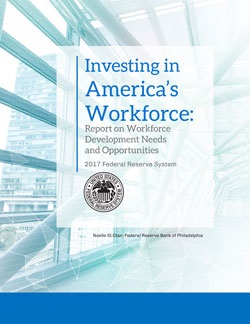2025

Worker and Learner Perspectives: Insights from Participants in Outcomes-Based Training Programs 
This chapter in the Social Finance Institute's Workforce Realigned, Vol. II highlights the importance of qualitative feedback for developing, adapting, and evaluating training programs.
This chapter in the Social Finance Institute's Workforce Realigned, Vol. II highlights the importance of qualitative feedback for developing, adapting, and evaluating training programs.
2024

Worker Voices Special Brief: Using Qualitative Research to Understand the Economy: A Toolkit 
Analysts with the Federal Reserve's Worker Voices Project have created a user friendly, downloadable toolkit to teach others how to employ community-engaged qualitative research practices in community impact assessments and research.
Analysts with the Federal Reserve's Worker Voices Project have created a user friendly, downloadable toolkit to teach others how to employ community-engaged qualitative research practices in community impact assessments and research.

Worker Voices Special Brief: Self-Employment, Dreams Versus Reality 
This brief discusses the variety of reasons that self-employed workers are pushed or pulled into self-employment and compares those motivations to understand the disconnect between aspirations and actual experiences.
This brief discusses the variety of reasons that self-employed workers are pushed or pulled into self-employment and compares those motivations to understand the disconnect between aspirations and actual experiences.

Understanding SNAP's Role 
This article by the Richmond Fed explores the role of the Supplemental Nutrition Assistance Program (SNAP) in alleviating poverty. It highlights enrollment trends, key outcomes, and the part played by community organizations.
This article by the Richmond Fed explores the role of the Supplemental Nutrition Assistance Program (SNAP) in alleviating poverty. It highlights enrollment trends, key outcomes, and the part played by community organizations.

Coping with Hardship: Navigating Economic Challenges amid Pandemic-era Constraints 
Low- and moderate-income, Black, and Hispanic workers were particularly affected by a loss of income during the pandemic. This American Voices Project brief examines how survey participants tackled financial hardship during the recent crisis.
Low- and moderate-income, Black, and Hispanic workers were particularly affected by a loss of income during the pandemic. This American Voices Project brief examines how survey participants tackled financial hardship during the recent crisis.

Worker Voices Special Brief: Pursuing Advancement through Personal Investment 
This brief explores a significant topic that emerged from the focus groups of 2022—strategies to secure improved employment outcomes. For these workers, personal investment yielded mixed results.
This brief explores a significant topic that emerged from the focus groups of 2022—strategies to secure improved employment outcomes. For these workers, personal investment yielded mixed results.
2023

Worker Voices Special Brief: Barriers to Employment 
This brief explores how barriers such as a lack of training or a lack of childcare often prevent workers without four-year degrees from securing a quality job even in a strong labor market.
This brief explores how barriers such as a lack of training or a lack of childcare often prevent workers without four-year degrees from securing a quality job even in a strong labor market.

Worker Voices Special Brief: Perspectives on Job Quality 
From job security to employee engagement, treatment, and compensation, this brief from the Federal Reserve System's Worker Voices explores how noncollege workers describe a quality job.
From job security to employee engagement, treatment, and compensation, this brief from the Federal Reserve System's Worker Voices explores how noncollege workers describe a quality job.

New Study Features Unique View on Labor Market 
A new study from the Federal Reserve System, "Worker Voices: Shifting Perspectives and Expectations on Employment," looks at how job seekers and workers in lower-wage roles navigated the labor market throughout the COVID-19 pandemic.
A new study from the Federal Reserve System, "Worker Voices: Shifting Perspectives and Expectations on Employment," looks at how job seekers and workers in lower-wage roles navigated the labor market throughout the COVID-19 pandemic.

A Late Start: Understanding Public Investments in Education 
This research brief from the Federal Reserve's Early Care and Education Work Group provides an overview of some of the factors limiting the supply of early education and care.
This research brief from the Federal Reserve's Early Care and Education Work Group provides an overview of some of the factors limiting the supply of early education and care.

Closing the Digital Skill Divide 
New research by the Atlanta Fed in partnership with the National Skills Coalition provides data to communities, businesses, educators, and policymakers on practices that focus on the skills aspect of the digital divide.
New research by the Atlanta Fed in partnership with the National Skills Coalition provides data to communities, businesses, educators, and policymakers on practices that focus on the skills aspect of the digital divide.
2022

Childcare Affordability Affects Labor Market and Family Choices 
Challenges parents face in paying for childcare can alter the way they interact with the labor market. The pandemic hasn't helped. Read a new brief from the Federal Reserve's Early Care and Education Work Group.
Challenges parents face in paying for childcare can alter the way they interact with the labor market. The pandemic hasn't helped. Read a new brief from the Federal Reserve's Early Care and Education Work Group.

Why CRA Modernization Matters
Vice Chair Lael Brainard of the Board of Governors and President Raphael Bostic of the Atlanta Fed discuss why it is essential to modernize the regulations that implement the Community Reinvestment Act (CRA). They also address the continued relevance that the CRA has in communities in the Southeast and across the country.
Vice Chair Lael Brainard of the Board of Governors and President Raphael Bostic of the Atlanta Fed discuss why it is essential to modernize the regulations that implement the Community Reinvestment Act (CRA). They also address the continued relevance that the CRA has in communities in the Southeast and across the country.
2021

American Voices Project: Monitoring the Crisis 
The American Voices Project examines the effects of the COVID-19 crisis on people across the country. The Atlanta and Boston Feds and the Stanford Center on Poverty and Inequality are cosponsoring the series.
The American Voices Project examines the effects of the COVID-19 crisis on people across the country. The Atlanta and Boston Feds and the Stanford Center on Poverty and Inequality are cosponsoring the series.

Considerations in Deploying ARPA Funds for Childcare 
Investments in childcare can support the nation's economic recovery and address challenges that perpetuate inequities in access. This brief shares considerations for ways to provide financial assistance to providers and the families they serve.
Investments in childcare can support the nation's economic recovery and address challenges that perpetuate inequities in access. This brief shares considerations for ways to provide financial assistance to providers and the families they serve.

Navigating a Crisis: An Uneven Recovery for Communities and Organizations in the Southeast 
Community and Economic Development staff talked to organizations that serve LMI households, BIPOC communities, and others that have experienced chronic disinvestment to better understand their challenges and successes during the COVID-19 pandemic.
Community and Economic Development staff talked to organizations that serve LMI households, BIPOC communities, and others that have experienced chronic disinvestment to better understand their challenges and successes during the COVID-19 pandemic.

Small Business Survey 
Reports information about the business performance, financing needs and choices, and borrowing experiences of businesses with fewer than 500 employees.
Reports information about the business performance, financing needs and choices, and borrowing experiences of businesses with fewer than 500 employees.

Special Briefing: Despite CDC Moratorium, Atlanta-Area Eviction Filings Hit Low-Income, Minority Neighborhoods 
This paper examines eviction filings that occurred during the pandemic in the Atlanta metro area. The authors find that a neighborhood's racial composition and median income serve as strong indicators of pandemic eviction filings.
This paper examines eviction filings that occurred during the pandemic in the Atlanta metro area. The authors find that a neighborhood's racial composition and median income serve as strong indicators of pandemic eviction filings.

Tackling Vacancy and Abandonment: Strategies and Impacts after the Great Recession
This joint research publication by the Atlanta Fed, Cleveland Fed, and Center for Community Progress explores the challenges associated with vacant and abandoned properties since the mortgage crisis and offers lessons for future policies and strategies.
This joint research publication by the Atlanta Fed, Cleveland Fed, and Center for Community Progress explores the challenges associated with vacant and abandoned properties since the mortgage crisis and offers lessons for future policies and strategies.
2020

The American Dream or Just an Illusion? Understanding Land Contract Trends in the Midwest Pre- and Post-Crisis 
This paper examines contract for deed activity across six midwestern states. Researchers from the Federal Reserve Banks of Atlanta, Chicago, and Cleveland collaborated on the paper.
This paper examines contract for deed activity across six midwestern states. Researchers from the Federal Reserve Banks of Atlanta, Chicago, and Cleveland collaborated on the paper.

Small Businesses of Color Recovery Guide 
The purpose of this guide is to help support the recovery of small businesses of color by providing readers with a range of ideas in the areas of small business credit and capital, education and training, policy recommendations, and community support. The Federal Reserve Banks of Atlanta and Kansas City collaborated on the publication.
The purpose of this guide is to help support the recovery of small businesses of color by providing readers with a range of ideas in the areas of small business credit and capital, education and training, policy recommendations, and community support. The Federal Reserve Banks of Atlanta and Kansas City collaborated on the publication.
2019

Consumer & Community Context 
This issue of the Federal Reserve's Consumer & Community Context features three articles analyzing small businesses' access to capital.
This issue of the Federal Reserve's Consumer & Community Context features three articles analyzing small businesses' access to capital.
2018

Building a Skilled Workforce for a Stronger Southern Economy 
The report examines the structural roots and policy decisions in the South that created the current skills gap, and it offers solutions to close that gap. The Atlanta Fed's Center for Workforce and Economic Opportunity, St. Louis Fed, and National Skills Coalition collaborated on the report.
The report examines the structural roots and policy decisions in the South that created the current skills gap, and it offers solutions to close that gap. The Atlanta Fed's Center for Workforce and Economic Opportunity, St. Louis Fed, and National Skills Coalition collaborated on the report.

Strength in Numbers: The Growth and Evolution of CDFI Partnerships 
The publication documents eight community development financial institution (CDFI) partnership models and details the challenges CDFI partnerships face as the industry develops. The Federal Reserve Banks of Atlanta, Minneapolis, St. Louis, and Richmond collaborated on the publication.
The publication documents eight community development financial institution (CDFI) partnership models and details the challenges CDFI partnerships face as the industry develops. The Federal Reserve Banks of Atlanta, Minneapolis, St. Louis, and Richmond collaborated on the publication.
2017

Investing in America's Workforce: Report on Workforce Development Needs and Opportunities 
The report shares insights from focus groups with leaders from around the country on what is needed to improve workforce outcomes and investments. The community development departments of all 12 Reserve Banks and the Board of Governors collaborated on the report.
The report shares insights from focus groups with leaders from around the country on what is needed to improve workforce outcomes and investments. The community development departments of all 12 Reserve Banks and the Board of Governors collaborated on the report.

Looking for Progress in America's Smaller Legacy Cities: A Report for Place-Based Funders 
The report describes a study tour undertaken by representatives from four Federal Reserve Banks and more than two dozen place-based funders, under the auspices of the Funders' Network-Federal Reserve Philanthropy Initiative.
The report describes a study tour undertaken by representatives from four Federal Reserve Banks and more than two dozen place-based funders, under the auspices of the Funders' Network-Federal Reserve Philanthropy Initiative.

Uneven Opportunity: Exploring Employers' Educational Preferences for Middle-Skills Jobs 
The Federal Reserve Banks of Atlanta and Philadelphia investigate the factors that are related to the variation in employer requests for bachelor's degrees for four key opportunity occupations among U.S. metropolitan areas.
The Federal Reserve Banks of Atlanta and Philadelphia investigate the factors that are related to the variation in employer requests for bachelor's degrees for four key opportunity occupations among U.S. metropolitan areas.

Developing Career-Based Training 
Like the Atlanta Fed's first ebook, Models for Labor Market Intermediaries, Developing Career-Based Training is a collaboration of national experts in workforce development. It is also a companion to the 2015 publication, Transforming U.S. Workforce Development Policies for the 21st Century Off-site link. Developing Career-Based Training contains case studies that highlight local and regional efforts across the country. It explores how workforce development programs have created training for workers, including career and technical education, competency-based education, industry and employer investment in career pathways, health care worker education, sector-based training strategies, and training for disadvantaged populations.
Like the Atlanta Fed's first ebook, Models for Labor Market Intermediaries, Developing Career-Based Training is a collaboration of national experts in workforce development. It is also a companion to the 2015 publication, Transforming U.S. Workforce Development Policies for the 21st Century Off-site link. Developing Career-Based Training contains case studies that highlight local and regional efforts across the country. It explores how workforce development programs have created training for workers, including career and technical education, competency-based education, industry and employer investment in career pathways, health care worker education, sector-based training strategies, and training for disadvantaged populations.
2016

Models for Labor Market Intermediaries 
This ebook explores the role of community and economic development organizations in workforce development and the importance of fostering and facilitating partnerships to address local workforce challenges.
This ebook explores the role of community and economic development organizations in workforce development and the importance of fostering and facilitating partnerships to address local workforce challenges.

Following the Money: An Analysis of Foundation Grantmaking for Community and Economic Development  | Data tool
| Data tool
The analysis presented in this article reviewed nearly 169,000 community and economic development grants made by the largest foundations between 2008 and 2013 to identify metro-area characteristics that are associated with higher levels of grant receipt.
The analysis presented in this article reviewed nearly 169,000 community and economic development grants made by the largest foundations between 2008 and 2013 to identify metro-area characteristics that are associated with higher levels of grant receipt.
2015

Transforming U.S. Workforce Development Policies for the 21st Century 
The book explores how new policies and practice can meet the changing needs of workers, businesses, and their communities. The Atlanta and Kansas City Feds and Rutgers' Heldrich Center for Workforce Development collaborated on the book, which has contributions from over 65 leading scholars and practitioners engaged in workforce development.
The book explores how new policies and practice can meet the changing needs of workers, businesses, and their communities. The Atlanta and Kansas City Feds and Rutgers' Heldrich Center for Workforce Development collaborated on the book, which has contributions from over 65 leading scholars and practitioners engaged in workforce development.


